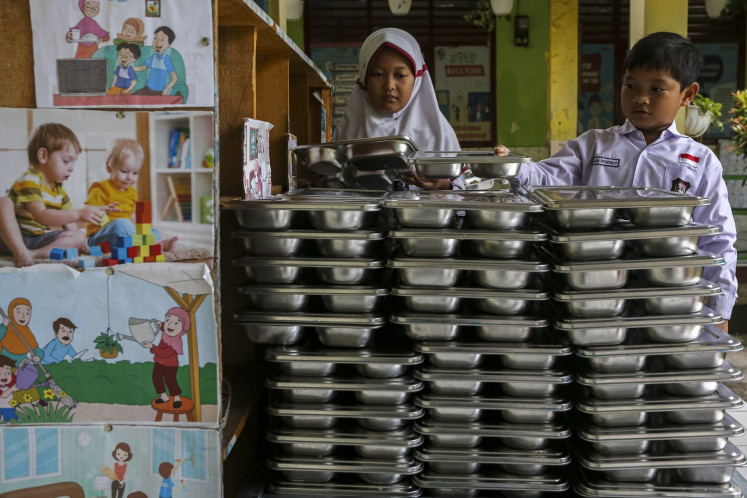Post-2015 MDGS: RI to avoid overhaul of millennium goals
Bilateral talks: Colombian Foreign Minister Maria Angela Holguin (left) is welcomed by her Indonesian counterpart, Marty Natalegawa, prior to their bilateral meeting on the sidelines of the United Nations’ High Level Panel meeting on Post-2015 Millennium Development Goals in Nusa Dua, Bali, on Tuesday
Change text size
Gift Premium Articles
to Anyone

B
span class="caption" style="width: 510px;">Bilateral talks: Colombian Foreign Minister Maria Angela Holguin (left) is welcomed by her Indonesian counterpart, Marty Natalegawa, prior to their bilateral meeting on the sidelines of the United Nations’ High Level Panel meeting on Post-2015 Millennium Development Goals in Nusa Dua, Bali, on Tuesday. (AP/Firdia Lisnawati)
One day ahead of the fourth High Level Panel on the Millennium Development Goals (MDGs), President Susilo Bambang Yudhoyono says Indonesia will avoid an overhaul of the existing framework in shaping a post-2015 development agenda.
Yudhoyono did not elaborate, fueling speculation that he was responding to demands from civil society groups that the UN impose binding, instead of voluntary, commitments to support the MDGs from member states.
Critics have said that voluntary commitments to the MDGs were among causes of signs that the goals would not be reached by the agreed deadline of 2015.
The President, a co-chair of the UN-appointed panel, made his remarks as he opened the Indonesia MDG Awards in Tanjung Benoa, Bali, on Tuesday.
“I personally disagree with a completely different set of post-2015 development programs from the existing MDGs framework,” Yudhoyono said. “It is still under discussion and will later be presented to the UN secretary-general.”
The ideas behind the post-2015 MDGs and the existing MDGs would be identical, Yudhoyono argued, with ending poverty made the priority.
“Even on various occasions, some world leaders — my best friends — have pointed out not revamping the MDGs,” the President said. “Then suddenly, in 2015, appears a new development framework that is totally different.”
Yudhoyono cited proposals he raised during earlier meetings of the Panel.
“First, we shall maintain the existing MDGs framework, which has eight goals. Second, we can improve it or add an extra one or two goals,” the President said. “Third, we can set up a completely different framework.”
Yudhoyono urged all stakeholders in Indonesia to remain focused on achieving the current goals ahead of 2015.
On a statement made available on his official website presidenri.go.id, Yudhoyono said that the MDGs were not the perfect international instrument for global development, as they were not binding.
“They do not require ratification by each nation’s parliament. No organization is specifically tasked to conduct, supervise and monitor the MDGs. The MDGs are voluntary,” Yudhoyono said.
Previously, a world forum of civil society organizations urged Yudhoyono to push for greater state responsibility to ensure people’s welfare, especially in developing countries.
They argued that the responsibility of states in the post-2015 agenda should be laid out clearly through a binding universal mechanism.









